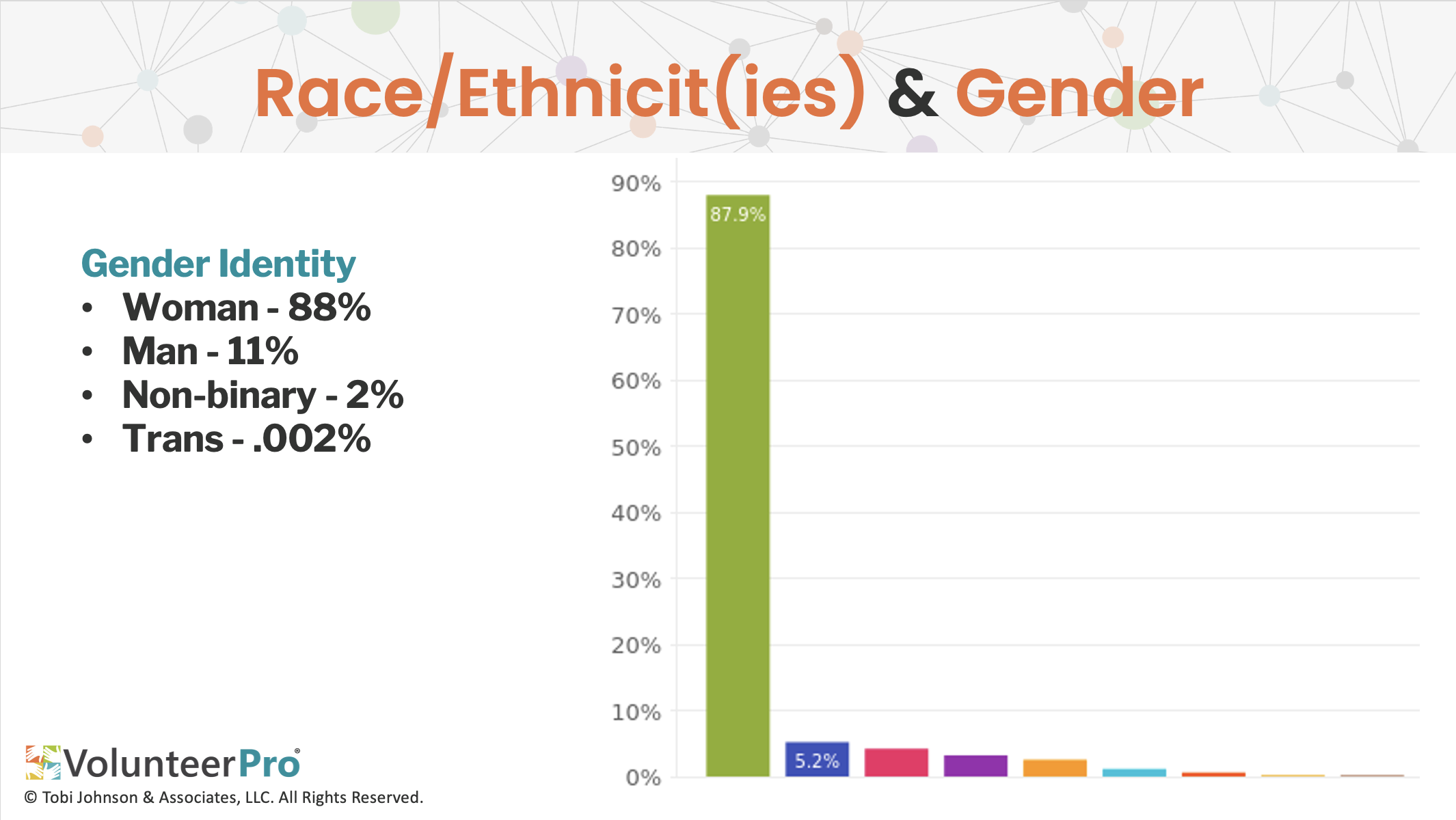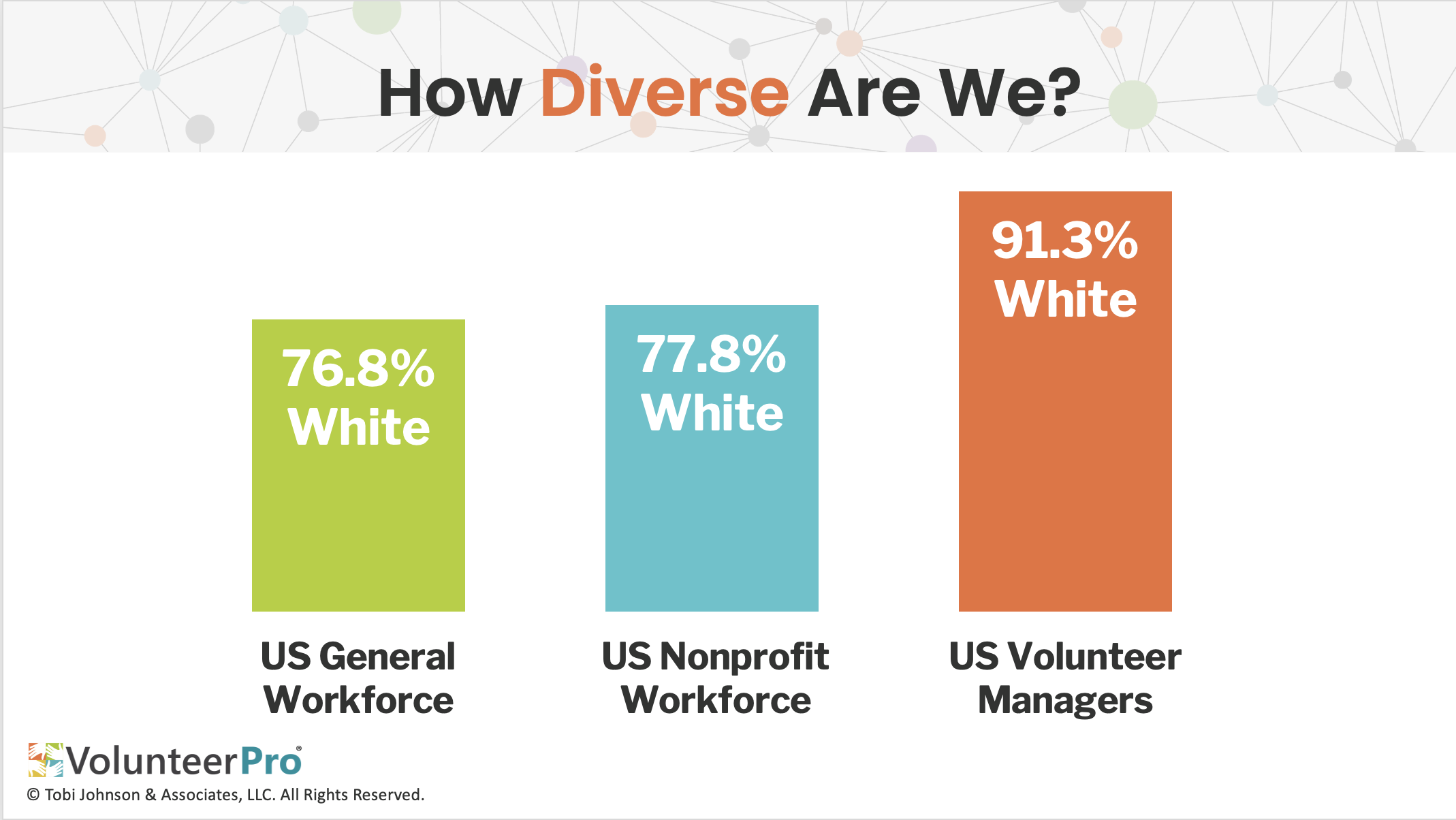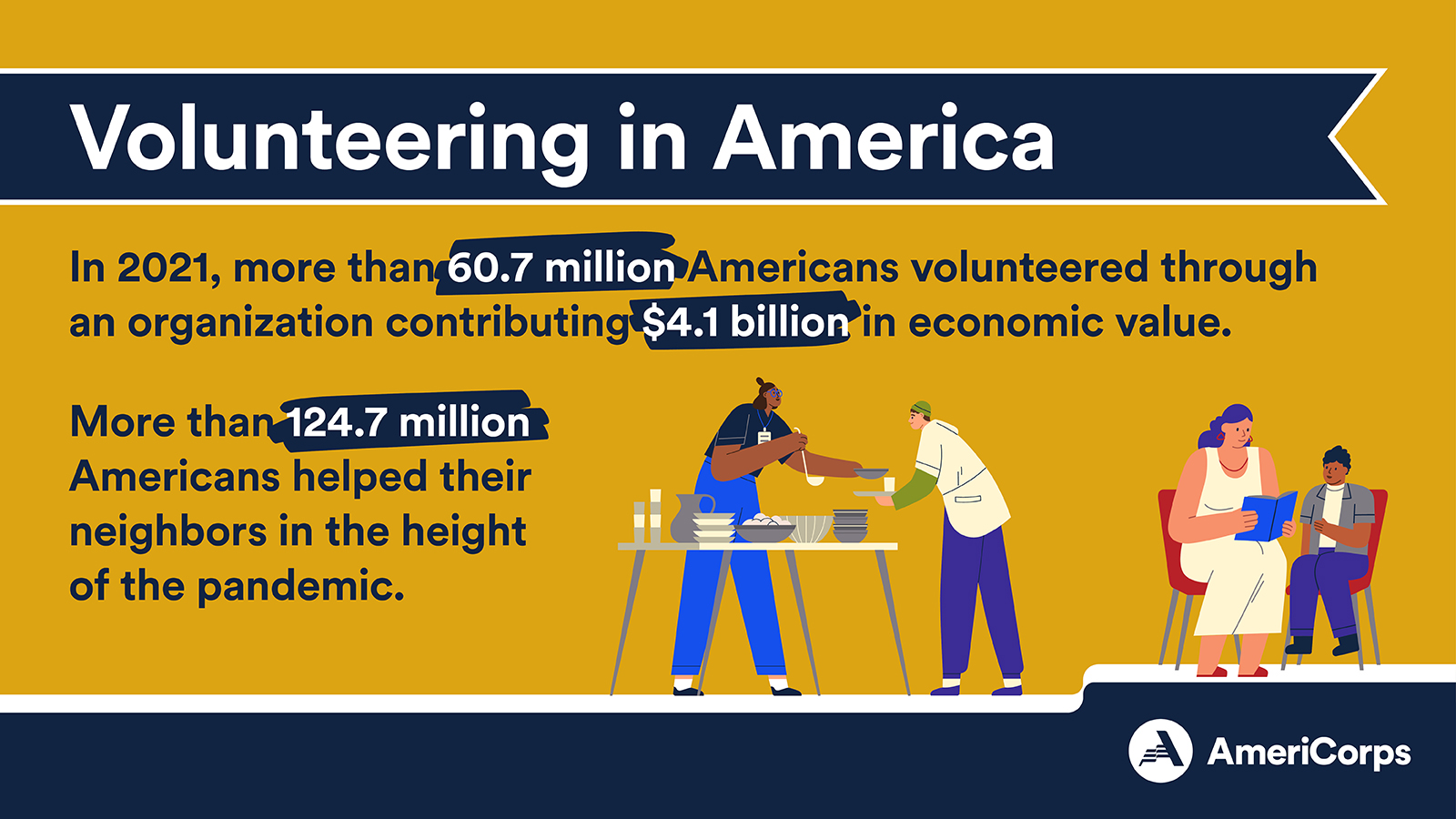Diversity and Inclusion in Volunteer Opportunities: What’s the Role of Volunteer Managers?
While many people are interested in promoting and championing diversity and inclusion in volunteer opportunities, my sense is that many people feel overwhelmed with the idea of actually pulling it off.
On a personal level, they feel worried or confused about how to support more inclusive volunteerism. They may wonder if they are the right person to lead such an effort.
On an organizational level, they may feel frustrated that their nonprofit hasn’t taken more concrete steps toward their diversity, equity, and inclusion efforts. Or they may be disappointed with their results so far.
They may even distrust their organization’s ability to embrace the real changes needed. They may worry that they’ll set others up to fail or cause more harm than good. They may be discouraged by past attempts that didn’t go as well as they hoped.
They may also wonder how they could possibly add one more initiative to an already overflowing plate. They may be struggling with the time they need to carve out in order to take action on improving the diversity and inclusion in volunteer opportunities at their organization by working in communities.
It takes time, consistency, and patience to foster partnerships and collaborations with diverse groups who have a stake in your mission and may be willing to help identify potential volunteers. It may simply be difficult to carve out time to leave the office.
As a leader, while the work of promoting more inclusive volunteerism may feel like the right thing to do, it may also feel like walking tough quicksand, dragging your feet to only make only a few inches of progress.
Now imagine the flip side.
What if, despite all of the fears and anxieties, they moved forward anyway? What if they took concrete action steps to build bridges to diversity and inclusion volunteer opportunities at their organization?
What if – rather than trying to solve all of the world’s problems (or even those at their nonprofit), and instead they decided to begin with their own mindset and the culture of their team, however small?
And, what if – by doing so – they became a beacon of light for others to follow that could make the consideration of more purposeful diversity and inclusion in volunteer opportunities within their own team. And what if their opportunities were transformed into a more meaningful place for volunteers from all walks of life to give time and talent?
That would be pretty wonderful, wouldn’t it?
When discussing the promotion of diversity and inclusion in volunteer opportunities, it makes sense to explore who would (most likely) be leading the charge. The good news is that we have some recent data on the demographics of leaders of volunteers.
Diversity in Volunteer Management Staff
In our most recent Volunteer Management Progress Report, we highlighted the continued and pervasive lack of diversity in volunteer coordinators. Even with a global survey, the results were striking.
When analyzing the data this year, we wondered – How does the diversity of volunteer managers compare with other workforces? And – Is diversity an issue within the nonprofit workforce in general or is it limited to volunteer managers?
First, we found that our survey respondents continue to represent a homogenous field of professionals. And, because of the sheer number of respondents (nearly 1,600 people this year) – and many observations at gatherings of leaders of volunteers – we believe this to represent the field fairly well.
The consistencies are telling, too. We are a profession that is dominated by women, with 87.9% noting their gender identity as Female (for comparison, 88.1% identified as Female in 2022, 87% in 2020, 88% in 2019, 91% in 2018, 88% in 2016/17).
We also overwhelmingly represent a single race. 83.8% of respondents identify as at least partly White (with the opportunity to choose multiple races in the survey). This has also remained consistent over the years with 84% identified as White in 2020, 91% in 2019/2018, 89% in 2016/17.
Volunteer Manager Diversity
We asked – Which races(s)/ethnicit(ies) best describes you? (choose all that apply)
- White/Caucasian/European Descent – 88.0%
- Black/African American/African- 5.21%
- Hispanic/Latinx – 4.2%
- Asian/South Asian – 3.2%
- American Indian, Alaska Native, or Aleut – 1.1%
- Middle Eastern/North African- 0.6%
- Caribbean – 0.2%
- Native Hawaiian or Other Pacific Islander – 0.2%
- Aboriginal or Torres Strait Islander- 0.1%
- Prefer to self-describe – 2.5%
This year reflects a light shift in the diversity of our sector over the past four years, with a 3.1% drop in White volunteer managers taking part since our 2019 report, where 91% indicated their race/ethnicity was White.
Also, important to note – the survey attracted a larger number of global respondents this year (leaders of volunteers from 39 countries took part); however, most respondents (79%) were from the United States.
In terms of the context within which volunteer managers do their work, we also explored comparisons between volunteer managers in the United States (or primary response population) and nonprofit workers in general.
According to the Independent Sector, in the third quarter of 2022, the nonprofit workforce in the US continued a trend of losing racial and ethnic diversity. The proportion of White workers (77.8%) is higher than pre-pandemic levels in the nonprofit sector (approximately 70%) and is slightly higher than the overall workforce (76.8%).
Volunteer Manager Homogeneity
According to our findings, volunteer managers represent significantly less racial diversity than the nonprofit workforce, with only 8.7% people of color and 13.5% more White workers than nonprofits in general.
- US Workforce – White – 76.8%
- US Nonprofit Workforce (September 2022)
- White – 77.8%
- Black/African American/African- 12.2%
- Hispanic/Latinx – 10.8%
- Asian/South Asian – 7.0%
- American Indian, Alaska Native or Aleut – 1.0%
- Multi-racial – 2.1%
Mutigenerational Volunteer Managers
The only area of demographic diversity in leaders of volunteers that represents a fairly equal distribution of people is age, where we find that our field continues to be a multi-generational group of professionals
We asked – “What is your age?”
- 18 to 24 – 3.2%
- 25 to 34 – 18.9%
- 35 to 44 – 22.4%
- 45 to 54 – 23.4%
- 55 to 64 – 22.6%
- 65 to 74 – 7.8%
- 75 or older – 1.8%
To download your free copy of our 54-page state-of-the-industry Volunteer Management Progress Report, go HERE >>
Gatekeepers to Diversity and Inclusion in Volunteer Opportunities
If you are a leader who represents the majority, the data from our report may come as a surprise, or it may confirm what you already know.
You may also be wondering two things:
1.) Does the lack of diversity in volunteer managers directly affect diversity and inclusion in volunteer opportunities?
2.) Do I have a responsibility to investigate and root out any bias that impacts diversity and inclusion in volunteer opportunities?
From my perspective, the answer is fairly simple – Yes on both counts.
Leaders of volunteers are the ultimate gatekeepers for volunteerism. You decide where volunteer opportunities are posted and what they say, where invitations to participate are shared, who is featured on your website or on social media, and how volunteers are vetted.
What’s more, you decide to whom and how you will conduct outreach, to which communities and to what extent.
You design volunteer work and roles and the level to which you can offer volunteers flexibility. And you coach others on how to treat and support volunteers.
There is a fair amount of power in your role, even if you don’t see it or it feels insignificant when compared to others in your organization.
But rest assured, it’s there.
For a self-reflective look at inclusivity and some focused questions to ask, check out Volunteer Nation Episode #011: Is Your Org Ready for More Inclusive Volunteering HERE >>
The recently released AmeriCorps Volunteering & Civic Life in America research has found a major decline in volunteerism in the United States.
They note, that “the rate of formal volunteering through organizations dropped by seven percentage points, from 30 percent in 2019 to 23.2 percent in 2021, during the COVID-19 pandemic.”
Yet, at the same time, they report that “the rate of Americans informally helping others remained stable between 2019 and 2021. Nearly 51 percent of Americans or 124.7 million people informally helped their neighbors between September 2020 and 2021.”
So, it appears community members have not lost their passion for serving others, even when it may harm their health and safety.
While we may lack research that points to a direct causal relationship between the demographics of volunteer managers and those of the volunteers they engage, there appear to be interesting correlations.
According to the demographic data of who volunteers, 25.3% of women in the US volunteer formally for organizations, while 21% of men do (at 4.3% less than women). Interestingly, when it comes to informal helping, 50.2% of women in the US volunteer, while 51.6% of men do (at 1.4% more than women).
Volunteer Diversity
As for race, an analysis of the data set reveals the percentage of those who reported volunteering and their race:
- White – 13%
- Hawaiian/Pacific Islander – 10%
- Black – 8%
- Multi-racial – 8%
- Asian – 7%
- American India/Alaskan Native– 7%
Finally, when it comes to age, similarly to volunteer managers, there is a wide range of age groups involved. All ages are involved with both formal and informal volunteering.
So, it appears that there are correlations between the demographic makeup of volunteers and the staff who lead them. While we can’t claim causality, it certainly gives a person pause.
Guiding Principles for Our Practice
It also helps to reflect on what should guide our practice as professionals.
Is championing diversity and inclusion in volunteer opportunities part of the essential duties of a leader of volunteers? Or is it optional?
When it comes to the ethical practice of volunteer engagement, the Council for Certification in Volunteer Administration is the keeper of ethics for the global field of volunteer management.
Their Core Values and Principles specifically call out inclusivity as an ethical practice in two places:
CITIZENSHIP: The Administrator of Volunteers understands that volunteerism is a foundation of civil societies and guides the organization and its stakeholders toward active community participation.
- Dignity: Act in a compassionate manner that upholds the right of all volunteers to be valued and involved in decisions that affect them.
- Inclusivity: Encourage and facilitate the participation of individuals from diverse backgrounds, perspectives, and abilities.
- Privacy: Protect the privacy of individuals and information considered confidential.
FAIRNESS: The Administrator of Volunteers commits to individual and collective efforts that build and support a fair and just organizational culture.
- Honesty: Commit to the truth and strive for transparency.
- Integrity: Demonstrate consistency between word and action by practicing ethical decision‐making and addressing conflicts of interest.
- Commitment: Act in a forthright manner with sincere good intent and follow through on promises and agreements.
For more on the CCVA’s Volunteer Management Progress Report, go HERE >>
What’s more, the International Association for Volunteer Effort (IAVE) Universal Declaration on Volunteering asserts the following …
This Declaration supports the right of every woman, man, and child to associate freely and to volunteer regardless of their cultural and ethnic origin, religion, age, gender, and physical, social or economic condition. All people in the world should have the right to freely offer their time, talent, and energy to others and to their communities through individual and collective action, without expectation of financial reward.
We seek the development of volunteering that:
- elicits the involvement of the entire community in identifying and addressing its problems;
- encourages and enables youth to make leadership through service a continuing part of their lives;
- provides a voice for those who cannot speak for themselves;
- enables others to participate as volunteers;
- complements but does not substitute for responsible action by other sectors and the efforts of paid workers;
- enables people to acquire new knowledge and skills and to fully develop their personal potential, self-reliance and creativity;
- promotes family, community, national and global solidarity.
Finally, once we understand the standards upheld by global governing bodies of volunteerism and volunteer administration, the question then becomes – Have these ideals been embraced by organizations that engage volunteers? And, if so, to what extent? And what work is left to do to ensure that all volunteers are welcomed and treated fairly and equitably?
If organizations wish to seek and engage volunteer support for their missions, it makes sense that they not only support the ethical practices above, but that they also commit the resources to making them a reality for all volunteers.
So, to revisit our two questions:
- Does the lack of diversity in volunteer managers directly affect diversity and inclusion in volunteer opportunities?
While we can’t say for sure, there certainly appears to be commonalities between the groups. It bears deeper exploration on a personal and organizational level. We must all ask ourselves – In what ways might we be creating barriers to diversity and inclusion in volunteer opportunities? And what can we do to ensure that everyone feels welcome?
- Do volunteer managers have a responsibility to investigate and root out any bias that impacts diversity and inclusion in volunteer opportunities?If we subscribe to the standards that guide our practice of volunteer management, then we are called to find ways to develop and promote more equitable contexts for volunteerism. And it’s up to us to educate our co-workers and leadership that this is, indeed, a required – not a “nice to have” – part of the job.
So, what’s the role of volunteer managers in supporting and enabling diversity and inclusion in volunteer opportunities? To advocate, design, implement, and champion.
It’s also to be brave and to push through our own doubts and fears, fueled by the commitment that volunteering is for everybody, and that everybody has a right to contribute to the greater good.









